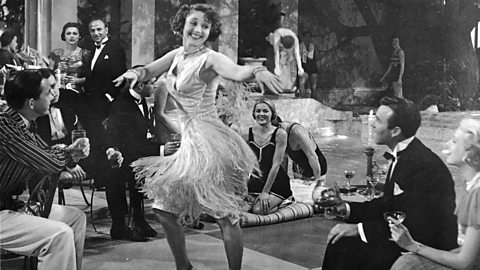How setting is used
In this extract from F. Scott FitzgeraldвҖҷs The Great Gatsby, the narratorвҖҷs description of his neighbourвҖҷs house parties establishes an atmosphere of luxury and glamour:
In his blue gardens men and girls came and went like moths among the whisperings and the champagne and the stars. At high tide in the afternoon I watched his guests diving from the tower of his raft, or taking the sun on the hot sand of his beach while his two motor-boats slit the waters of the Sound, drawing aquaplanesA wide, wooden board used for a type of water-skiing (popular in the 1920s). over cataractsA waterfall. of foam. On weekends his Rolls-Royce became an omnibus, bearing parties to and from the city between nine in the morning and long past midnight, while his station wagon scampered like a brisk yellow bug to meet all trains.вҖқ
The Great Gatsby, Chapter 3, Scott Fitzgerald
Example analysis
- Several archaicOld-fashioned, or no longer in everyday use. words suggest that this setting is in the past, вҖң...omnibusвҖҰ motor-boatsвҖҰaquaplanesвҖҰвҖқ
- The authorвҖҷs description of the setting establishes an atmosphere of wealth and indulgence, with the вҖңchampagneвҖҰhis beachвҖҰRolls-RoyceвҖҰmotor-boats.вҖқ
- The author presents the narratorThe teller of a story; the voice in a text that describes or narrates the events of the plot. The narrator is often either a character in the story, or an authorial voice who gives a commentary on events but doesn't take part. as an observer of this setting - he is an outsider looking in.
- The use of metaphorical language also gives a suggestion of a detached narrator viewing an unfamiliar setting, вҖңвҖҰlike moths...like a brisk yellow bugвҖҰвҖқ These insect simileA comparison using 'like' or 'as' to create a vivid image, eg as big as a whale; float like a butterfly, sting like a bee. create a feeling of an observer watching a strange, new world.
- The setting is described in a cinematicHas the feel of a film way, with the narrator sweeping his eyes over several locations - the garden, the raft, the beach and the water.
- This sense of movement from one setting to another establishes a feeling of energy. This is also suggested by the use of phrases like вҖңcame and wentвҖҰto and fromвҖҰscampered.вҖқ
- There is also a contrast between the setting of the gardens at night (whisperingвҖҰblueвҖҰstars) and the afternoon at the beach (sunвҖҰhotвҖҰslit the waters). The juxtapositionTo place two or more ideas/images close together to create further meaning for an audience. of these settings within one paragraph makes them seem even more vivid.
- The author uses personal pronounThe pronouns in English (I, you, he, she, it, we, they, me, him, her, us, and them) showing contrasts of person, gender, number, and case. to create a strong link between one of the characters and this setting, вҖңвҖҰhis gardensвҖҰhis guestsвҖҰhis raftвҖҰhis two motor-boatsвҖҰhis Rolls-RoyceвҖҰhis station wagonвҖҰвҖқ Although we donвҖҷt know who вҖҳheвҖҷ is in this extract, the reader can see that he owns this world of luxury and pleasure.
